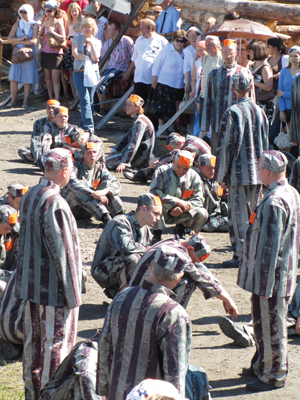From Russia, with guts
Immersive opera might only just be catching on in Britain but, as David Staples reports, Opera Gulag has already gone some way to show us how art imitates life

Perm 36 is the last remaining Russian Gulag camp – a museum and memorial to political repression. The Gulag was created by the Soviet Union to provide the slave labour that Stalin believed he needed to exploit the country’s natural resources. By 1953, when Stalin died, it is believed that some 18 million Russians had been imprisoned in such a camp. Located in the foothills of the Ural Mountains, Perm 36 opened in 1946. It was converted into a political prison and became home to many of the Soviet Union’s most prominent dissidents. It was a forced labour camp with the men working on lumber processing. It finally closed in 1988, only 22 years ago, after attempts by local KGB and interior ministry police to destroy the site. Most of the other Russian camps no longer exist – they have rotted away or been deliberately destroyed to wipe out a disturbing memory of the Soviet era. Perm 36 was saved and it is a bleak scene of former cruelty and injustice.
Beethoven’s only opera, ‘Fidelio’, is also about false imprisonment, cruelty, injustice and the abuse of power. It was first produced in Vienna in 1805. It is normally seen inside the world’s finest opera houses under ideal conditions – good acoustics, lighting, wonderful performers and stunning scenery. Fidelio was rarely performed in Soviet Russia as its plot was too controversial. The Bolshoi was allowed to produce it in 1954 only after Stalin’s death.
OPERATION OPERA
Last month a new production of Fidelio premiered in Perm 36. The promenade performance had the singers and audience, herded by prison guards, moving through the camp as the performance progressed. As the 1,000 inmates in the camp were housed in bleak dormitories each accommodating 250, the production team decided to limit the audience to the same number. But in a magnificent and truly mammoth Russian spectacle the production featured more than 600 musicians, singers
and extras.
While the goal was to maintain high production values, the constraints of working within a former labour camp and constructing a promenade performance with the entire production moving around the camp, inevitably meant standards were compromised. The production might have lacked the polish and precision of a major opera house, but the symbolism of staging such a powerful opera in a place of such evil was extraordinary.
WALK THE LINE
The audience was bussed from the city of Perm some 200km away. Advised to wear stout shoes and suitable clothing to protect from ticks, they experienced a powerful and unique operatic event. The first act was staged in the high security area. Lunch in the interval was served on rough wooden trestles in the middle of the camp. An indeterminate meal was dolloped onto plastic plates leading one lady to enquire “…was this risotto?” She was bluntly advised “buckwheat”. Although an open air picnic, this was as far removed from the sylvan setting of Glyndebourne as possible. Lunch was followed by a half kilometre walk to the even more chilling ‘Special Section’ where political dissidents were housed.
But Fidelio was not an one-off production: “Two years before he died, my father received a letter. It was another of those numerous demands, requesting the rights to adapt one of his books: ‘One Day in the Life of Ivan Denisovich’. When he finished reading this letter he was in tears.” This letter was from Geroge Issakyan, the director of the Perm Opera, to Alexander Solzhenitsyn’s son. Permission was granted and last May saw the world premiere of a new opera scored by Alexander Tchaikovsky. Solzenhitsyn won the Nobel prize for his moving and often amusing account of a day in a Gulag. The production was directed by George Issakyan and won a Golden Masque – the Russian equivalent of an Olivier or Tony award.
The production was staged by the Perm State P. Tchaikovsky Theatre and Ballet company. Perm is a city of around a million people, a two hour flight east from Moscow, in the Urals. An opera theatre was built in Perm in 1878. Supporters of the theatre (called the Tchaikovsky House, after Pyotr Tchaikovsky who was born nearby) included the Diaghilev family, whose son Sergei went on to found the Ballets Russe that revolutionised ballet (and shocked Paris) at the beginning of the twentieth century. Ballet in the city received an unexpected boost in 1943 when the Kirov Ballet was evacuated to Perm from the besieged Leningrad (now St Petersburg).
POWER AND PERFORMANCE
George Issakyan and the Tchaikovsky House have started the Opera Gulag Project with two extraordinary productions. Operas that not only move and inspire audiences but also cause their country to confront the horrors and injustices of the recent past. What next? The drama theatre in Perm is planning a production of Tom Stoppard and Andre Previn’s ‘Every Good Boy Deserves Favour’ – a play with an orchestra centred around false imprisonment and persecution, set in an oppressive mental hospital/prison. The Opera Gulag project again illustrates the power of the performing arts. Perhaps Fidelio will be presented in Guantanamo Bay in 30 years’ time?

Join the Discussion
You must be logged in to post a comment.